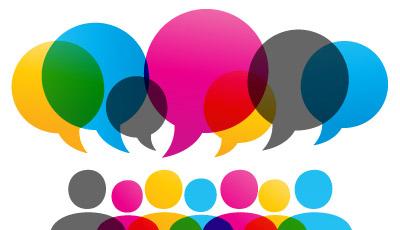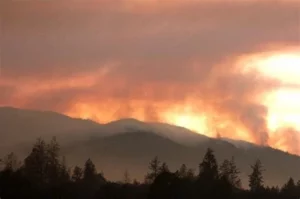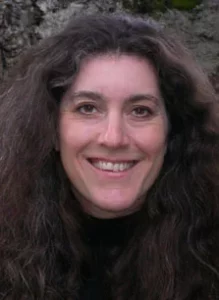 “Language Is A Virus“… that’s the title of a song by performance artist Laurie Anderson. How true it is. We tend to think that the language we use, the way we express ourselves, has no impact on our state of consciousness. We think that all that really matters is our meaning, not our actual words.
“Language Is A Virus“… that’s the title of a song by performance artist Laurie Anderson. How true it is. We tend to think that the language we use, the way we express ourselves, has no impact on our state of consciousness. We think that all that really matters is our meaning, not our actual words.
But what if our words actually matter? What if the way we express ourselves not only reflects our inner state, but affects it too — even causes it?
I remember a time, not too long ago, when using the “F” word would be unthinkable to me. And I am a person who, I must admit, tends to curse quite a bit. Still, the “F” word seemed a bit too extreme for me. Now, it seems to punctuate every sentence we hear in the movies and on TV. On many comedy shows, you can’t even make out what people are saying because of all the bleeping! Indeed, I must admit that I use the “F” word now too.
But lately, I’ve begun to think twice about the almost unconscious evolution of our contemporary English (and perhaps especially, American) lexicon toward the vulgar. It all began when I read a short but amazingly touching and transformational book by a Hawaiian wise woman named Nana Veary, Change We Must. Nana grew up at a time when traditional Hawaiian ways were still taught by the older generation. Change We Must is her spiritual autobiography, full of simple yet deep wisdom that jumps out and grabs your heart. It has brought me to tears many times.
In the first chapter, entitled “My Hawai’i”, Nana discusses the loss of the Hawaiian language, whose teaching and speaking was forbidden by missionaries for many years. Nevertheless, Nana was taught to speak Hawaiian in the old way. As she writes:
“Rich in metaphor, the Hawaiian language was melodious and graceful like the people. The Hawaiians said, ‘He nane ka ‘olelo.’ The language is a riddle. Before the missionaries came… the Hawaiians used figures of speech in language that was like poetry….
My mother taught me to speak the language softly, without saying anything negative or elaborating. ‘Leave the details out,’ she said, ‘and speak softly.’ … All the ancient chants are in idioms, but today there is virtually nobody, not even those fluent in Hawaiian, who speaks that way.”
Nana tells the story of a boy who ran up to her grandfather on the beach and told him he was thirsty. The grandfather replied with a figure of speech, referring to a coconut “as a fountain of water hanging in the air.” Thus, rather than telling the boy to climb the tree, get a coconut, and crack it open, the grandfather supplied the boy with a spiritual image that conveyed the special gift of the coconut to humanity. He taught the boy a spiritual lesson that connected him to the wonders of nature, rather than provide a rote form of instruction.
Nana goes on to say,
“This use of language vanished long ago. Hawaiians today speak the missionary language, a literal type of Hawaiian. The riddle is gone. This is tragic, for when you lose the language, you lose your identity… When you land in Japan, Japanese is spoken. When you land in France, French is spoken. The Hawaiians have nothing, nothing but aloha, and even that they have to re-learn.”
As we enter February, with Valentine’s Day at its heart on the 14th, let us consider our use of language and its effects. What we say fills the fields of meaning in which we live with a particular energy that affects ourselves and everyone around us. As I also discuss in my book Active Consciousness, spiritual teacher G.I. Gurdjieff warned against talking too much. Compulsive or idle chatter is not only a way to avoid one’s true feelings, but it also saps one’s vital energy, leaking it out onto everyone else.
As Laurie Anderson sang in her song, language is a virus that can infect us for bad or for good. One lyric from the song is the following:
“Paradise is exactly like
Where you are right now,
Only much much better.”
As those of us who have been to Hawaii know, it is a paradise, and not just because of its beauty; you can still feel the spirit of Aloha there. Nana Veary writes,
” ‘Alo’ means the bosom, the center of the universe. ‘Ha’ is the breath of God. The word is imbued with a great deal of power. I do not use the word casually. Aloha is a feeling, a recognition of the divine. It is not just a word or greeting. When you say ‘aloha’ to someone, you are conveying or bestowing this feeling.”
And so, with deep intention and love, I say to you all: Aloha.




Aloha Amy!
What a blessing to read your post today! Thank you. I went online after my first practice of Y-Dan, and found your blog post about when I Googled it. A caregiver that I know and respect recommended the DVD of Y-Dan, along with Fem-mate. Do you still practice Y-Dan regularly? It is certainly much easier and less time consuming that Bikram yoga which I gave up a couple of years ago because I just didn’t have the time or energy.
Thank you also for your reference to Nana Veary and what you wrote about our spoken words. I am looking forward to reading her book! I live in Bend, Oregon but just found out yesterday that my husband will be starting a job at Kamehameha Schools Bishop Estate in Honolulu in April. I will follow him there in June after my two kids are out of school. We met and married and had our first child there, who coincidentally is also “Nana” by us. Her real name is Alanna – It’s half my husband’s name, ALbert and half my name RoseANNA.
I am (soon to be was) a “Challenging Behaviors” teacher for Oregon Care Partners and travel throughout the state training caregivers who work in adult foster homes. I also own(ed) a business that helps older adults and their adult children with the crisis of aging. Yes, unfortunately it usually is a crisis for many families because they are sorely under prepared for loss – most of us are. I’ve also been a chaplain and I think that is what I may do in Hawaii, but who knows?
Mostly though, I am a seeker of God and I am very intrigued by your work. I feel as if I have been hooked like a fish into it. It has touched on all of the key areas going on in my heart and life right now! I look forward to reading it and maybe even corresponding with you occasionally as we journey together!
Aloha nui loa
Rosie